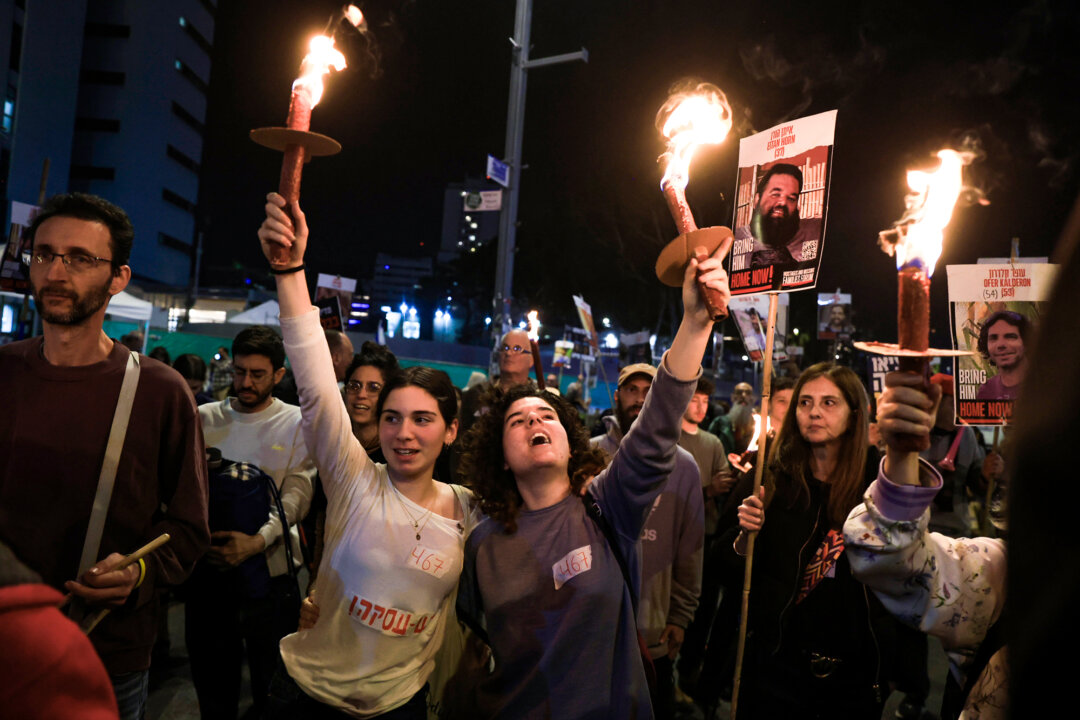


Israel and Hamas, which have fought for more than 15 months in Gaza following Hamas’s Oct. 7, 2023, terrorist attack, now have a hostages-for-prisoners swap and temporary cease-fire agreement on the table.
If all goes well, it will take effect on Sunday, Jan. 19, a day before President-elect Donald Trump is inaugurated and President Biden leaves office. They each announced the deal on Wednesday; Trump in a social media post and Biden in a public statement and then a White House speech.
Both men’s teams worked intensively in the days leading to the deal, forged in Doha, Qatar, one of three mediating nations, along with the United States and Egypt.
Is the Deal Final Yet?
No. And there appear to be last-minute snags. Israeli Prime Minister Benjamin Netanyahu’s office said Wednesday that he would meet with his security cabinet on Thursday to vote on the proposal. But his office said Thursday morning that the meeting had been postponed.“Hamas has reneged on parts of the agreement reached with the mediators and Israel in an effort to extort last-minute concessions,” the prime minister’s office said in a statement.
Hamas on Wednesday accused Israel of making new demands that caused a delay.
For the deal to be finalized by Sunday, Israel’s security cabinet will need to meet late Thursday, early Friday before the Jewish Sabbath begins at sundown, or Saturday evening after the Sabbath ends.
What Are the Terms of the Deal?
Netanyahu’s office has said it won’t discuss the terms until the deal is final. Qatar’s prime minister, Sheikh Mohammed bin Abdulrahman Al Thani, said Wednesday the first of three planned phases would include the release of 33 hostages being held by Hamas for an unspecified number of Palestinian prisoners held by Israel.Al Thani said those hostages would include civilian women, female soldiers, children, elderly people, and civilians who are ill or wounded. He did not specify whether all of the hostages would be living. Israel has sought the return of dead hostages’ bodies. Hamas is believed to be holding 98 hostages, living or dead. Israel estimates a third of those are dead.

According to Bassem Naim of Hamas, the terror group will release three female Israeli civilian hostages on the first day of the cease-fire and four more on the seventh day. After that, Hamas would release three Israeli “detainees” every seven days starting with women civilians and soldiers.
The Israel Defense Forces (IDF) would pull back first toward the east and then to the border, Al Thani said. During the first phase, negotiations would continue to reach a second phase accord. Relief aid for Gaza would be expedited to help reopen essential services such as schools, hospitals, and bakeries.
What About the American Hostages?
Premium Picks
Trump has threatened “all [expletive] to pay” if the hostages, particularly the Americans among them, aren’t released by Jan. 20. He has declined to elaborate on what that meant.
Two Americans held hostage, Keith Seigel and Sagui Dekel-Chen, are expected to be included in the first group of hostages designated for release, a senior administration official said on Wednesday.
Siegel qualified as an older male and Dekel-Chen because he was shot and wounded on Oct. 7, 2023. Siegel’s wife Aviva Siegel was released by Hamas in November 2023. Also believed to be alive is 21-year-old Edan Alexander. He’s an Israeli-American who was captured while serving in the IDF. Soldiers will probably be released last.
Four more American hostages are believed to be dead: Omer Neutra, Itay Chen, Gadi Haggai, and Judi Weinstein.
How Has the Deal Been Received?
Israelis see it at best as a mixed bag. It allows for hostage return but meanwhile releases many Palestinian prisoners convicted of acts of terror going back years or decades.
Iran’s Revolutionary Guards in a statement called it a “great victory” for the Palestinian resistance. Yemen’s Houthis, who have attacked Israel as well as international and U.S. naval shipping, said Israel had “failed miserably” in Gaza.
Civilians both in Gaza and Israel awaited developments with trepidation, fearing last-minute snags delaying peace on the Gaza side and hostage release on the Israeli side.
Some Israeli conservatives have prioritized defeating Hamas, the charter of which swears Israel’s destruction, over freeing the hostages. Some demonstrated against the deal in Jerusalem after it was announced. Many in November 2024 decried the cease-fire with Hezbollah, on the grounds that the Israeli army had the Lebanese terror group on the run and should have kept fighting to finish the job.
What Does Netanyahu’s Cabinet Think?
National Security Minister Itamar Ben Gvir has said he'll vote against the deal and has threatened to pull his nationalist Otzma Yehudit party out of Netanyahu’s coalition if it goes through.Ben Gvir’s frequent cabinet ally, Treasury Minister Bezalel Smotrich, earlier expressed opposition to the deal without threatening to leave the coalition over it. Wednesday evening, though, his Religious Zionism party did make that threat.

Smotrich said he demanded, as a condition for remaining in the government, “total certainty of a return to war with great force, in full capacity, and in a new fashion until full victory in all its components, led by the destruction of the terror organization Hamas and the return of all hostages to their homes.”
Another cabinet member, Diaspora Affairs and Combatting Antisemitism Minister Amichai Chikli from Netanyahu’s own Likud party, has threatened to quit if the deal includes a withdrawal from the Philadelphi Corridor, which Israel occupies along the Gaza–Egypt border to prevent arms smuggling to Gaza.
The Associated Press and Reuters contributed to this report.



